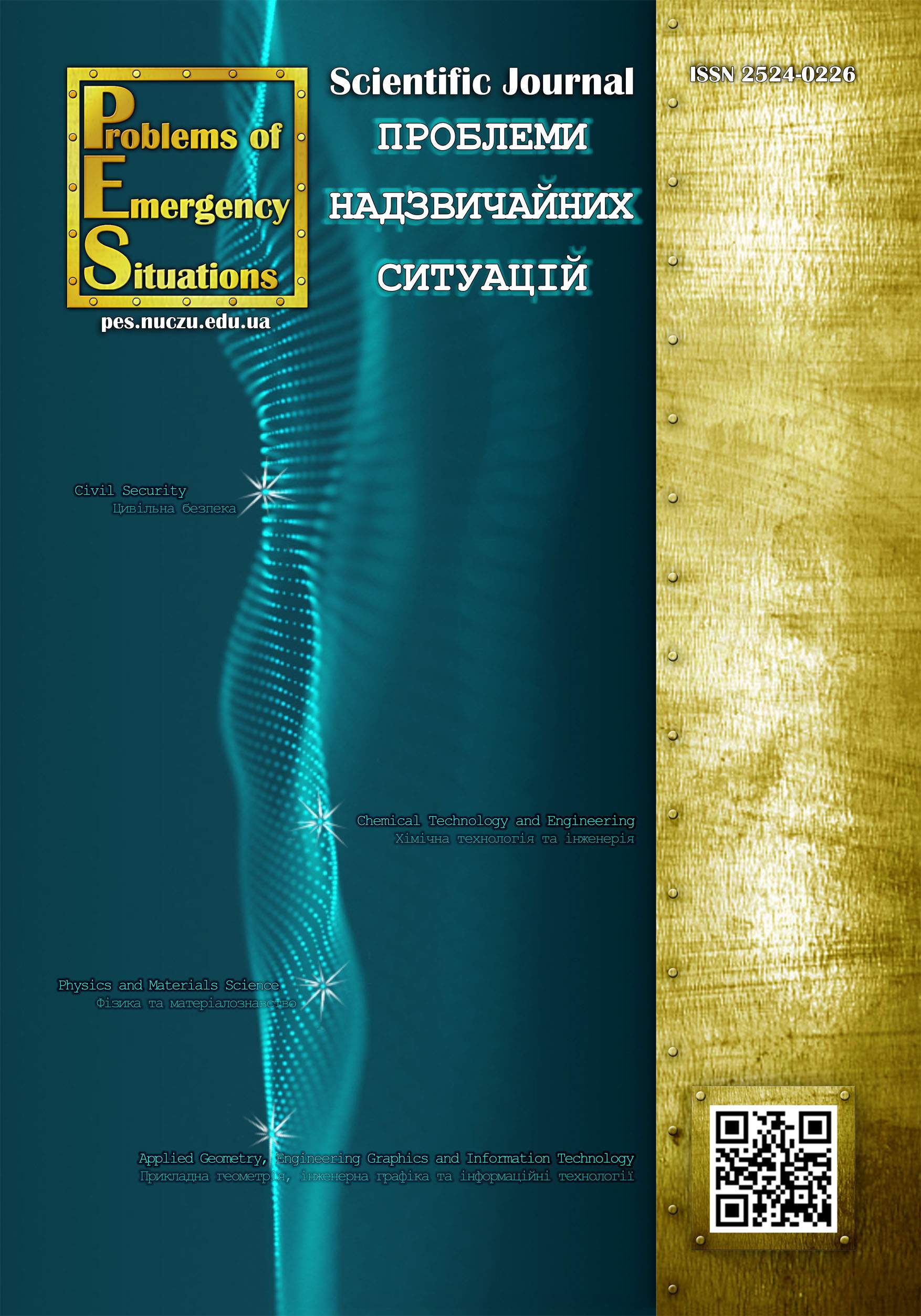Laws of the air flow in scba during the rescue operations in the deep foundation subway stations
Pavlo Borodych
National University of Civil Defence of Ukraine
https://orcid.org/0000-0001-9933-8498
Pavlo Kovalov
National University of Civil Defence of Ukraine
https://orcid.org/0000-0002-2817-5393
Valerii Strilec
LLC «Brand Trade»
http://orcid.org/0000-0003-1913-7878
Anton Myroshnychenko
National University of Civil Defence of Ukraine
https://orcid.org/0000-0002-2817-5393
DOI: https://doi.org/10.5281/zenodo.4400177
Keywords: compressed air apparatus, air consumption, metro, emergency and rescue work, gas and water defender
Abstract
The technical capabilities of compressed air devices that are in service in fire and rescue subdivisions are considered, if they are used by personnel of the units (departments) of the gas and smoke protection service during emergency rescue operations at deep underground metro stations, which are the most dangerous when they occur on fire or other emergency. In the course of the study, the results of special tactical exercises at deep-laid stations of the Kharkiv metro were used, which were organized in such a way that the times obtained experimentally for the execution of typical tasks by gas and smoke defenders, as well as the corresponding indicators of the initial and final pressure in cylinders of compressed air apparatus, became the basis for obtaining statistical samples of consumption air rescuers. The analysis of the results made it possible, with a significance level of α = 0.05, to show that the regularity of the air consumption in compressed air machines during the rescue operations at deep underground metro stations is the normal function of the indicator under consideration. It is noted that in all modes of operation in compressed air machines, the air consumption is higher not only the standard indicators of pulmonary ventilation, but also the indicators of the air consumption when performing the corresponding tasks in the heat-smoke chamber. The obtained ratio of the pressure change in compressed air machines when performing individual operations by gas and smoke defenders makes it possible to use it to substantiate recommendations related to clarifying the calculated ratios used at the security post of the gas and smoke protection service. It is shown that the minimum pressure in compressed air machines at the moment of exit should be three times the value by which the pressure decreased during the movement to the place of the emergency. On the basis of the revealed regularities, expressions are recommended for simplified calculations of the time of termination of exploration and the return of a link (section) of the gas and smoke protection service to clean air. The use of the proposed simplified relationships will allow the guard at the security post to pay more attention to the preparation of the link of the gas and smoke protection service and control of its work in the process of carrying out rescue operations.
References
- Belyatskiy, V., Pavlov, G. (2017). Methodological manual on the organization and tactics of extinguishing fires at metro facilities.
- Nastanova on the organization of the gas supply and control service in the departments of the Operational Service of the Ministry of Taxes and Duties of Ukraine: Order of the Ministry of Taxes and Duties of Ukraine No. (2011). 1342 dated 16 March 2011: Ministry of Supervision sieve. Ukraine, 56.
- DSTU EN 137: 2002. (2013). Vidanna. Give yourself up to the individual zaist of the organs of society. Autonomous reservoir technical equipment for the restraint. Vimogi, viprobuvannya, markuvannya. Kiev, 55. (Information and documentation).
- Kovalov, P. A., Strelets, V. M., Alizarov, O. V., Bezuglov, O. Y. (2011). Fundamentals of the establishment and operation of devices on a compressed basis: navch. posib. Kharkiv: ATSZU, 359.
- Recommendations for vivchenia of displaced counterparts “Drager” PA 90 SERIES {PA 92} at children of garnizons of fire protection. (2015). K.: UDPO MVS Ukrainy, 19.
- An official website of the United States government. «Occupational Safety and Health Administration». [Electronic resource]. Access mode: https://www.osha.gov/about.html
- 29 CFR 1910/156. Fire brigades. General requirements. [Electronic resource]. - Access mode: https://www.osha.gov/pls/oshaweb/owalink. query_links? src_doc_type = STANDARDS & src_unique_file = 1910_0156 & src_anchor_name = 1910.156
- OHSA 1910.134 Respiratory Protection. [Electronic resource]. - Access mode: https://www.osha.gov/pls/oshaweb/owadisp.show_document?p_table = STANDARDS & p_id = 12716
- NFPA 1001: Standard for Fire Fighter Professional Qualifications. [Electronic resource]. Access mode: http://www.nfpa.org/codes-and-standards/all-codes-and-standards/list-of-codes-and-standards?mode=code&code=1001
- Becoming a Firefighter. [Electronic resource]. Access mode: https://www.nh.gov/safety/divisions/fstems/training/becomff.html
- Recruitment. [Electronic resource]. Access mode: http://www.fire.nsw.gov.au/page.php?id=2
- NFPA Awareness: Describing the Concepts of JPRs and Revising Text. [Electronic resource]. Access mode: http://www.nfpa.org/Assets/files/AboutTheCodes/1001/Concepts_JPRs_ReviseText.pdf
- F. Michael Williams-Bell, Geoff Boisseau, John McGill, Andrew Kostiuk, Richard L. Hughson Physiological responses and air consumption during simulated firefighting tasks in a subway system. Applied Physiology, Nutrition, and Metabolism, 2010, 35(5), 671–678. [Electronic resource]. Access mode: https://doi.org/10.1139/H10-061
- 42 CFR 84 - APPROVAL OF RESPIRATORY PROTECTIVE DEVICES. Subpart H — Self-Contained Breathing Apparatus. [Electronic resource]. Access mode: https://www.gpo.gov/fdsys/pkg/CFR-2012-title42-vol1/pdf/CFR-2012-title42-vol1-part84-subpartH.pdf
- Bernzweig, D. Expanding “time to exit” for firefighters. Fire Engineering 157(6), 63–74. [Electronic resource]. Access mode: https://www.fireengineering.com/articles/print/volume-157/issue-6/features/expanding-time-to-exit-for-firefighters.html
- Kamon, E, Doyle, D, Kovac, J. (2012). The oxygen cost of an escape from an underground coal mine. American Industrial Hygiene Association Journal. 44(7), 552–555. Published online on August 13. [Electronic resource]. Access mode: https://europepmc.org/article/med/6613859
- Pollard, J. P., Heberger, J. R., Dempsey, P. G. (2015). Development of a model to determine oxygen consumption when crawling. Trans Soc Min Metall Explor Inc, 338(1), 441–447. [Electronic resource]. Access mode: https://www.ncbi.nlm.nih.gov/pubmed/26997858#
- Kathleen, M. Kowalski-Trakofler, Charles Vaught & Michael J. Brnich Jr. Expectations Training for Miners Using Self-Contained Self-Rescuers in Escapes from Underground Coal Mines. Journal of Occupational and Environmental Hygiene, 5(10), 671–677. [Electronic resource]. Access mode: https://www.tandfonline.com/doi/full/10.1080/15459620802333632
- V. Louhevaara, J. Smolander, O. Korhonen, T. (2010). Tuomi Maximal working times with a self-contained breathing apparatus. Ergonomics, 29(1), 77–85. Published online July 6, [Electronic resource]. Access mode: https://www.tandfonline.com/doi/abs/10.1080/00140138608968242
- Randy, W. Dreger, Richard, L. Jones & Stewart, R. Petersen Effects of the self-contained breathing apparatus and fire protective clothing on maximal oxygen uptake. Ergonomics 49:10, 911–920. [Electronic resource]. Access mode: https://www.tandfonline.com/doi/full/10.1080/00140130600667451
- Phillips, D. B., Stickland, M. K., Lesser, I. A. et al. (2016). The effects of heavy load carriage on physiological responses to graded exercise. Eur J Appl Physiol, 116: 275. Available at: https://doi.org/10.1007/s00421-015-3280-z
- Nastanova on the organization of the gas supply and control service in the departments of the Operational Service of the Ministry of Taxes and Duties of Ukraine: Order of the Ministry of Taxes and Duties of Ukraine No. (2011). 1342 dated 16 March 2011: Ministry of Supervision sieve. Ukraine, 56.
- DSTU EN 137: 2002. (2013). Vidanna. Give yourself up to the individual zaist of the organs of society. Autonomous reservoir technical equipment for the restraint. Vimogi, viprobuvannya, markuvannya, Kiev, 55. (Information and documentation).
- Kovalov, P. A., Strelets, V. M., Alizarov, O. V., Bezuglov, O. Y. (2011).Fundamentals of the establishment and operation of devices on a compressed basis: navch. posib. Kharkiv: ATSZU, 359.
- Recommendations for vivchenia of displaced counterparts “Drager” PA 90 SERIES {PA 92} at children of garnizons of fire protection. (2015). K.: UDPO MVS Ukrainy, 19.
- Strelets, V. М. Comparative analysis of regularities of air supply consumption when rescuers work in compressed air devices. (2014). Book of Science Prats of Kharkiv University of Applied Sciences, 4(41), 150–153.
- Strelets, V. M., Borodich, P. Yu., Rosokha, S. V. (2012). Laws of performance of workers in carrying out emergency operations at metropolitan stations: monograph. NUTSU. Kh., KP "Miska Drukarnya", 112.
- Khalafyan, A. A. (2017). STATISTISA 6 Statistical data analysis. M.: OOO "Binom-Press", 512.
- Kovalov, P. A., Strelets, V. M. (2011). Incomprehensive methods of rooting for an hour in robots in insoluble devices. Problems of fire safety, 22, 101–105.
- Rosokha, S. V., Strelets, V. M., Borodich, P. Yu., Kovalov, P. A. (2011). The value of the peculiarities of robots in izoluyushchie protigaz // Problems of supervised situations, 13, 47–57.














